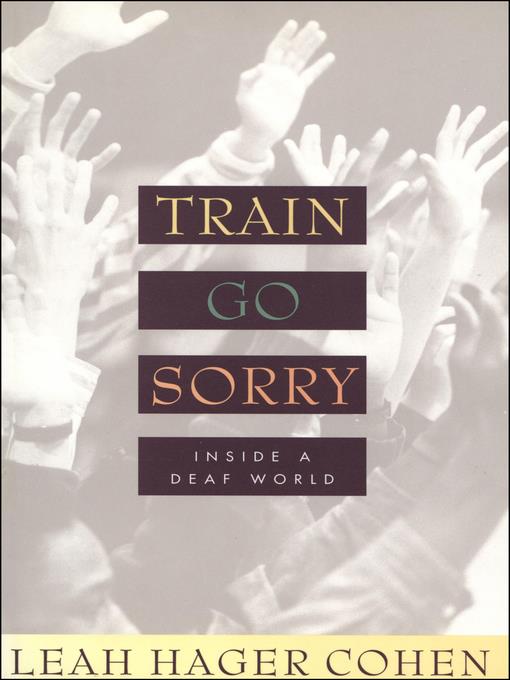
Train Go Sorry
Inside a Deaf World
کتاب های مرتبط
- اطلاعات
- نقد و بررسی
- دیدگاه کاربران
نقد و بررسی

January 31, 1994
Combining memoir and reportage, Cohen provides a sensitive, intimate portrait of a New York City school for the deaf and the issues facing the deaf community. Cohen is not deaf, but her father heads the Lexington School, and she grew up there. She tracks the progress of two students: Sofia, a Russian immigrant bravely learning a second sign language and a new American world; and ghetto-raised James, who finds stability after moving into the school dormitory. Cohen analyzes the fierce debates over mainstreaming the deaf, the value of oralism and whether new cochlear implants rob the deaf of their culture. She tenderly recalls her deaf grandparents, probes her father's dilemmas, reports on her frustrated romance with a deaf man and her work as an interpreter in a program for deaf adults at the City University of New York. She portrays sign language with wonderfully tactile prose--the word ``silence,'' for example, is signed with ``austere arcs.'' If Cohen's narrative is disjointed, her commitment and her descriptive gifts make her book memorable.

December 1, 1993
The history of the Lexington School for the Deaf, the oldest school of its kind in the nation, comes alive with Cohen's vivid descriptions of its students and administrators. The author, who grew up at the school, follows the real-life events of Sofia, a Russian immigrant, and James, a member of a poor family in the Bronx, as well as members of her own family both past and present who are intimately associated with the school. Cohen takes special pride in representing the views of the deaf community--which are sometimes strongly divided--in such issues as American Sign Language (ASL) vs. oralism, hearing aids vs. cochlear implants, and mainstreaming vs. special education. The author's lively narrative includes numerous conversations translated from ASL. This is a one-of-a-kind book for both young and old readers. Essential for special education collections.-- Arla Lindgren, St. John's Univ., New York
Copyright 1993 Library Journal, LLC Used with permission.

December 1, 1994
YA-Cohen draws upon her experiences as the hearing grandchild of deaf immigrants to combine personal stories of hearing-impaired individuals with related aspects of deaf culture. Using her first home and her father's place of employment, the Lexington School for the Deaf in New York City, to connect characters and experiences, she shares tales of activities familiar to young adults-boring classes, the school play, selling ads for the yearbook, graduation. The only difference for these students is that they cannot hear and cannot speak the language of the hearing world. Through Cohen, readers share in the challenges, frustrations, fears, triumphs, and joys of achievement not only of these young people, but, through historical vignettes, of her grandparents as well. This perspective allows readers to determine how (or if) life has changed for the deaf in America. A careful reading of Train Go Sorry provides exposure to the urban poor and our country's many immigrants (both past and present), making this a resource suitable for sociology or history students interested in viewing the American melting pot through the eyes of a group of people with a silent past.- Janis Ansell, Tidewater Association Hearing Impaired Children (TAHIC), Virginia Beach, VA

February 1, 1994
Leah Hager Cohen personalizes the issues facing the deaf culture by introducing their impact on her own family and the community of the Queens, New York City Lexington School for the Deaf. The characterizations of her hearing father, current superintendent of Lexington, and of her grandfather, a former student, are masterly. Throughout the book, Cohen focuses on two students whose Russian and African American roots exemplify the school's increasingly diverse population. Presenting both sides of such debates as using American Sign Language in the classroom and cochlear implants for children, Cohen truly involves readers in the problems of those she portrays. Her discussions support the existence of special schools for this group to provide for its members' particular communication and social needs. Well organized and beautifully written. ((Reviewed Feb. 1, 1994))(Reprinted with permission of Booklist, copyright 1994, American Library Association.)

























دیدگاه کاربران